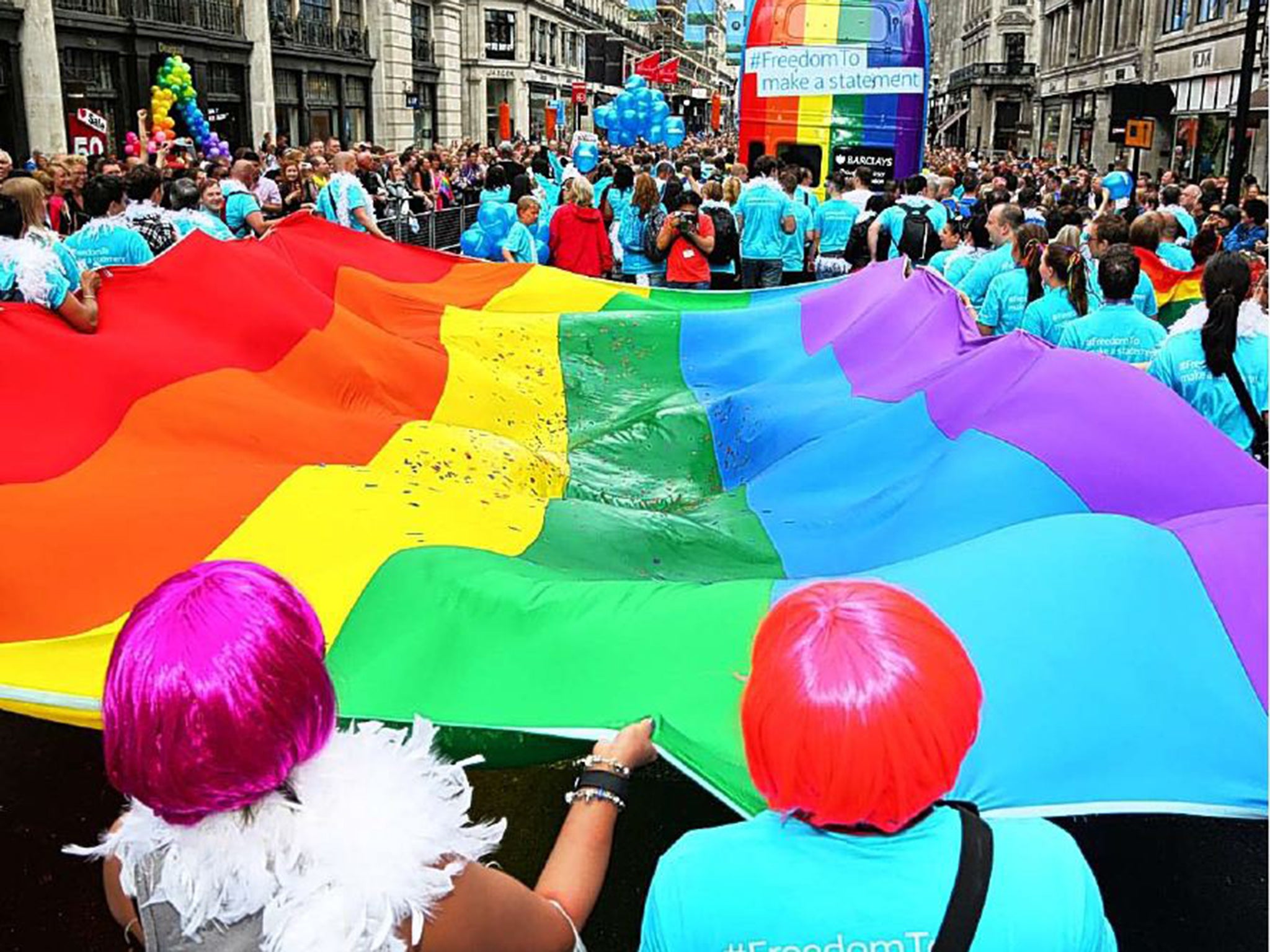LGBT issues low down or even non-existent on British company's diversity agendas
LGBT-friendly workplaces are increasing but not enough, says Kate Hilpern

Your support helps us to tell the story
From reproductive rights to climate change to Big Tech, The Independent is on the ground when the story is developing. Whether it's investigating the financials of Elon Musk's pro-Trump PAC or producing our latest documentary, 'The A Word', which shines a light on the American women fighting for reproductive rights, we know how important it is to parse out the facts from the messaging.
At such a critical moment in US history, we need reporters on the ground. Your donation allows us to keep sending journalists to speak to both sides of the story.
The Independent is trusted by Americans across the entire political spectrum. And unlike many other quality news outlets, we choose not to lock Americans out of our reporting and analysis with paywalls. We believe quality journalism should be available to everyone, paid for by those who can afford it.
Your support makes all the difference.‘If you feel you can be yourself at work – which in my case means being an openly gay man – then you’re much more likely to be productive,” says David Ali, a caretaker at Tower Hamlets Homes, which came fifth in Stonewall’s 2016 Workplace Equality Index, the national benchmark for LGBT-friendly workplaces.
It might sound obvious – and indeed, research backs it up – but for a surprising number of employers, LGBT issues are low down or even non-existent on their diversity agenda, with studies consistently showing that significant proportions of LGBT employees remain in the closet at work, fearful of the career implications.
At Tower Hamlets Homes, however, Ali says all employees are all trained around LGBT issues so that people don’t face unconscious discrimination. “They also promote events like LGBT History Month,” says Ali, who is Stonewall’s 2016 Role Model of the Year. “The organisation has allowed me to be a go-to person for anyone who has issues as a LGBT employee, and they’re always on the lookout for ways to further improve workplace practice for LGBT people.”
The housing sector is one of several that’s gaining an increasingly strong foothold in Stonewall’s Index – making up three out of this year’s top 10 employers. Local government, education, health and social care and the legal profession are also doing well, although retail and media employers have surprisingly poor representation this year. “Only two retailers, Asda and Co-operative, appear in our top 100 and none of the big traditional media outlets such as the BBC or Sky are there,” says Sarah Crowe, Stonewall’s client group manager. “I think it’s because there’s this perception that it’s okay to be gay in these industries, which can make them complacent. Conversely, investment banks have been traditionally ‘macho’ environments and many are therefore working extremely hard to change that.”
It’s not as if it has to take an age to change the culture. “There was much surprise about MI5 being the number one LGBT-friendly employer this year, especially as there was a ban on even working there if you were gay until the early 1990s. But it wasn’t such a surprise within Stonewall, as they’d been working so hard with us on the issues.”
Nobody gets anywhere near the top 100 unless they have LGBT-friendly HR policies that actually come to life within the organisation, with inclusion genuinely embedded throughout. LGBT staff networks can be particularly effective in achieving this, says Karin Cook, group director of operations at Lloyds Banking Group, which came second in this year’s Stonewall List – and who was herself Stonewall’s 2016 Senior Champion of the Year. “Ours, called the Rainbow Network, is extremely active, with around 2,000 members and we’ve also now launched an allies programme to encourage non-LGBT colleagues to join,” she explains.
Among the areas of focus for Lloyds this year is the transgender community, which has historically had a particularly difficult time in the workplace. “We’re looking at our healthcare provision for transgender colleagues, making sure it’s fully inclusive, for example.”
Crowe would like to see more reverse mentoring within organisations. “This has worked particularly well in MI5, whereby senior officials are reverse mentored by junior LGBT colleagues, so that they can understand the challenges and experiences they have on the ground. We’re also seeing more work on faith and LGBT and mental health, including breaking down myths,” maintains Crowe.
Many employers are working with suppliers to ensure they have LGBT friendly policies, while Suki Sandhu, CEO and founder of OUTstanding, which works with companies such as Lloyds Banking, would like to see more LGBT role models and champions at top levels. “When we work with company chairs or CEOs, they are often pale, male and stale, and it’s quite a job educating them around how to get LGBT higher on the diversity agenda. But there’s a very clear business case and above all, allowing your employees to be themselves is a human right.”
Join our commenting forum
Join thought-provoking conversations, follow other Independent readers and see their replies
Comments